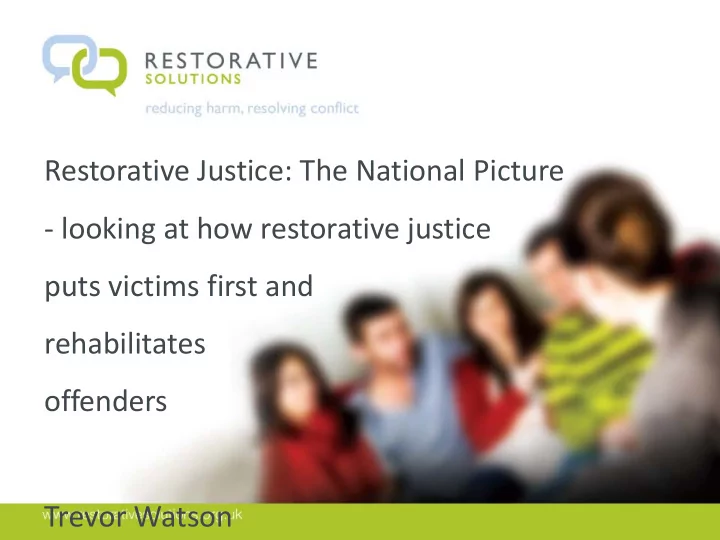

Restorative Justice: The National Picture - looking at how restorative justice puts victims first and rehabilitates offenders Trevor Watson
What is Restorative Justice ? 2
A definition A process whereby parties with a stake in a specific offence come together to resolve collectively how to deal with the aftermath of the offence and its implications for the future . Tony Marshall (1999) Restorative Justice: 3
Or simply ….. AN ALTERNATIVE WAY OF DEALING WITH CONFLICT & HARM 4
RJ National Developments • Offender led RJ • National Trials • Criminal Justice Process • Post sentence • Diversionary • Neighbourhood • Pre Sentence • Victim Services 5
Does it work? • RJ provides 85% victim satisfaction • Improvement in victim health – 36% fewer PTS symptoms • Victim Feelings – 62% better in some way (2% worse) • RJ reduces reoffending between 14 – 27% • 97% say conference “went well” • Provides value for money by saving the taxpayer £9 for every £1 spent on RJ Summary of Best Evidence paper to be circulated with presentation. 6
Why does it work? Harm is caused Negative feelings (affects) generated: Self questioning by those affected: •Hurt and shame can lead to loss •Why me •Was it my fault? of Confidence/Self Esteem •Could I have prevented it happening? Person / Organisation responsible acknowledges the harm caused NO YES Negative feelings and self blame increase, Through dialogue, anger replaces negative feelings negative feelings and self-blame Self-doubt, blame and hurt intensify are vented leading to closure and replace anger . 7 Shame/Anger loop (Sheff & Retzinger)
Victims Code Implications - Adults • If the offender is an adult, victims are entitled to receive information on Restorative Justice from the police and how you could take part. This is dependent on the provision. • Restorative justice can take place whilst criminal proceedings are ongoing or after the conclusion of criminal proceedings subject to availability. Where available, this will be led by a trained restorative justice facilitator who will take your needs into consideration. Appropriate measures will be put in place to make sure that anything you agree to take part in is safe. 8
Victims Code Implications – Young Persons • You are entitled to the following from your Youth Offending Team: • Participate in voluntary restorative justice activities where available; • Ask to be informed about the progress of the offender’s case if you agree to participate in a restorative justice activity; • Information on appropriate victims’ services if you ask for additional support. • You can ask the police not to pass on your details to a Youth Offending Team if you do not want to participate in restorative justice activities. 9
Victims Service Commissioning – Categories of Need “Getting it right for victims and witnesses”. • These categories of need are the areas in which service providers should aim to help victims of crime achieve improvements in their life following the offence which occurred. The categories of need are: • Mental and physical health; • Shelter and accommodation; Family, friends and children; • • Education, skills and employment; • Drugs and alcohol; • Finance and benefits; • Outlook and attitudes; and Social interaction. • 10
Victims Service Commissioning – OUTCOMES Victims’ service providers are expected to achieve two outcomes as set out in the Government consultation “Getting it right for victims and witnesses”: Helping victims first to cope with the impact of crime and, and subsequently to recover from the harm they have experienced although not all victims will return entirely to the lives they had before. 11
Support for Victim Focused RJ • “ I want restorative justice to become something that victims feel comfortable with requesting at any stage of the criminal justice system” • Jeremy Wright MP , Parliamentary Under- Secretary of State, Minister for Prisons and Rehabilitation. 2012 • Funding as part of Victim Services Commissioning 12
Victims’ rights will be enshrined in law - 2015 • A new law will guarantee key entitlements for victims, previously set out in the Victims Code. This will include the right to make a personal statement and ask to have it read it aloud in court; automatic referral to support organisations ; information about individual cases at each and every stage; and an assessment of victims’ needs at the earliest opportunity. The Rt Hon Chris Grayling MP - 14 September 2014 13
The science of Restorative Justice • Insert link here to the TED lecture 14
Questions? 15
Recommend
More recommend